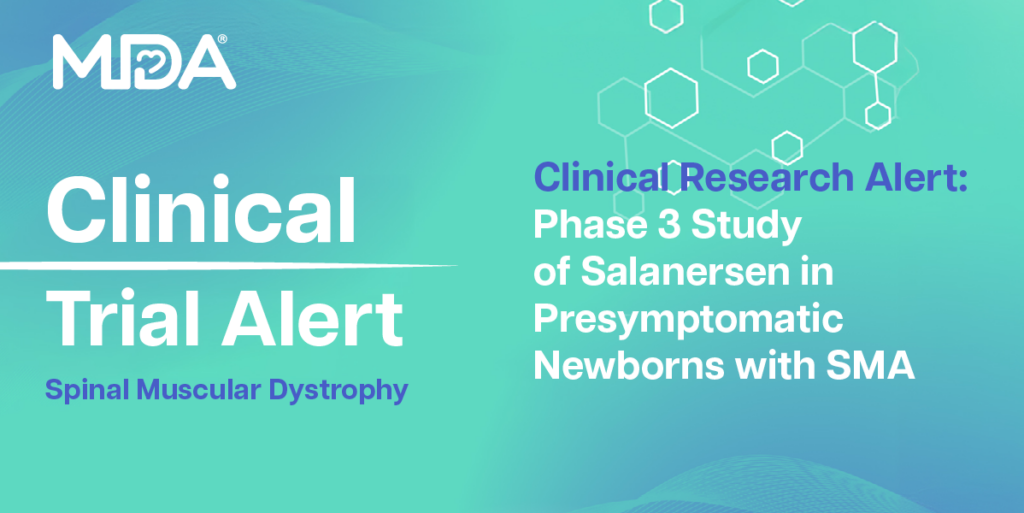
9 Questions to Ask Before Joining a Clinical Trial
By Myrna Traylor | Thursday, January 11, 2024
More novel therapies to treat neuromuscular diseases are being evaluated in clinical trials than ever before. For people affected by neuromuscular diseases, participating in a clinical trial can be an opportunity to help advance knowledge about a disease and ways to treat it. Because clinical trials can be long and involved, people interested in taking part should ask important questions before signing up.
Ask questions
It is important to get all your questions answered before and during a clinical trial so you can make informed decisions and know what to expect. You should always understand the requirements of a clinical trial and the potential risks and end goal.
Sharon Hesterlee, PhD, MDA’s Chief Research Officer, and Jeffrey Rosenfeld, MD, PhD, Professor of Neurology and Director of The Center for Restorative Neurology at the MDA Care Center at Loma Linda University Health in California, list nine essential questions to ask before joining a clinical trial.
1. What type of study is this?
There are three main types of clinical research studies.

Sharon Hesterlee, PhD, MDA’s Chief Research Officer
Clinical trials, also called interventional studies, are conducted to determine whether a medical strategy, treatment, or device is safe and effective for humans. Some clinical trials are testing a drug in people for the very first time. To compare a treatment to alternatives, a trial may have groups of participants receive different treatments, a placebo, or no treatment.
Observational studies are not used to test a treatment or device but instead aim to observe patients to better understand a disease. They may be used to determine how to diagnose a disease or to optimize testing procedures for future clinical trials.
Biomarker trials are designed to evaluate whether a specific test (for example, a lab test or imaging study) can correlate or predict disease progression or subtypes. These trials are important for developing better tools to test new drugs and assess how a disease presents over time.
2. Am I eligible?
Researchers want to enroll people with specific traits that will minimize safety concerns and help them collect the data they need. Common eligibility criteria include a specific diagnosis (which might need to be confirmed with genetic testing), a certain health history, or a target age range.
“It’s not just about having the diagnosis — the investigators may want to ensure that you don’t have another health problem that might not be a good fit for this experimental drug,” Dr. Hesterlee explains.

As Director of the Center for Restorative Neurology at the MDA Care Center at Loma Linda University Health in California, Jeffrey Rosenfeld, MD, PhD, is involved in neuromuscular disease research studies.
3. Why should I participate in this trial?
Dr. Rosenfeld stresses the importance of understanding the goals of a clinical trial and recognizing that personal results aren’t guaranteed. “When a person enters the research trial, and their expectation is that they will personally benefit from that trial, they set an expectation that may not be realistic,” he says. The drug might not be effective, or the individual may be assigned to a placebo group, for example.
In the US, about 10% of drug candidates successfully make it through the clinical trial stage to earn approval, but researchers learn more with each attempt. “People who want to participate should recognize that they’re helping people that might come after them with the same condition,” Dr. Rosenfeld says.
4. Where is the trial?
Is this a local trial, or will there be travel involved? “With rare diseases, because there are fewer patients, people frequently have to travel to trial sites,” Dr. Hesterlee says.
To understand the time commitment involved in the trial, you’ll want to find out how many times or how frequently you’ll need to visit the trial site. This could vary from once a week to once a year.
5. Is there assistance for travel or other expenses?
Many studies cover at least some research-related expenses, such as parking, meals, or travel and lodging. Studies run by pharmaceutical companies “tend to be better funded than academic trials, and they might be able to reimburse and organize travel better,” Dr. Hesterlee explains. Study coordinators generally want to help remove barriers to participation, so be sure to mention if cost is a factor for you.
6. How long will it last?
In addition to finding out when the trial ends, ask if there will be any follow-up after the trial. For example, in gene therapy, the US Food and Drug Administration (FDA) usually requires participants to be followed for a minimum of five years and sometimes up to 15 years, even after the trial stops.
“You might not be going in as much, but it might be a once-a-year commitment,” Dr. Hesterlee says.
7. What happens when the trial stops?
If you think the drug is benefiting you, will you be able to stay on it after the trial ends? That depends, according to Dr. Hesterlee.
“Sometimes they’ll offer expanded access or have a continuing study where people who were in the study are allowed to take the drug, even if they were originally given a placebo,” she says. Often, this is offered until the study data is fully evaluated and researchers determine whether the drug is beneficial.
8. What if the trial stops early?
There are several reasons a trial could stop before the planned end date. For example, if an interim data analysis shows that a drug doesn’t seem to be working or there are safety issues, a trial could be stopped or put on hold. “When this occurs, it is only after a committee of physicians has decided that the treatment is unsafe or futile,” Dr. Rosenfeld says. “This action is not common, but a committee is a part of most clinical trials to protect the participating patients.”
If the trial is stopped for safety reasons, participants will not continue to get the drug. If it’s stopped because of doubts about the drug’s efficacy, participants might be allowed to continue the drug for some time while the sponsor makes decisions.
9. What are my rights and responsibilities as a participant?
As a potential participant, you have a right to receive a written description of the trial specifics and what will be expected of you. You will also have the right to ask the study team questions until you are comfortable with your understanding of the study.
During the study, you are responsible for following the study protocol and informing the researchers about any side effects or health issues you face. If it is a placebo-controlled study, they may ask you not to talk with staff or other participants about whether you think you are receiving the placebo or active drug.
Participants always have the right to withdraw their consent and end participation in the trial, even after they have started taking the investigational drug. But the decision to leave a trial early should be made carefully and for definite reasons. Dr. Rosenfeld urges participants to complete the trial whenever possible because all the data collected is important for reaching a final conclusion about the treatment. “That’s how we can make a decision on whether to advance any new medication,” he says. “Missing data can reduce our ability to make the best decision.”
Finding a clinical trial
“People find out about trials in a number of different ways,” Dr. Hesterlee says. “You might get a flyer at your doctor’s office, the doctor might tell you about it, or you might find it in your own research.”
MDA’s resources for finding clinical trials include the Clinical Trial Finder tool and Clinical Trial Updates list. In addition, look for research updates on the Quest Blog and in the Progress Now section of Quest Magazine, and ask your MDA Care Center team to keep you informed about clinical trials that might be right for you or your child.
Once you have found a clinical trial that you are interested in, you can find answers to some of your questions by searching for the study on ClinicalTrials.gov. Research study sponsors and investigators list their studies in this online database maintained by the National Library of Medicine.
Listings generally include information on what the study is measuring, how it is designed, the expected timing, who can participate, and who to contact about the study. Many trials have a study coordinator who can answer questions and help address barriers to participation for eligible individuals.
Next Steps and Useful Resources
- MDA’s Clinical Trials Finder has a search tool and clinical trial FAQs.
- Find real-life stories and decision-making tools in How to Make a Decision About a Clinical Trial.
- Stay up-to-date on Quest content! Subscribe to Quest Magazine and Newsletter.
Disclaimer: No content on this site should ever be used as a substitute for direct medical advice from your doctor or other qualified clinician.




